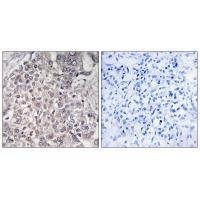
| WB | 咨询技术 | Human,Mouse,Rat |
| IF | 咨询技术 | Human,Mouse,Rat |
| IHC | 1/50-1/100 | Human,Mouse,Rat |
| ICC | 技术咨询 | Human,Mouse,Rat |
| FCM | 咨询技术 | Human,Mouse,Rat |
| Elisa | 咨询技术 | Human,Mouse,Rat |
| Aliases | Cytochrome P450 4F2; EC 1.14.13.30; CYPIVF2; Leukotriene-B(4) omega-hydroxylase; Leukotriene-B(4) 20-monooxygenase |
| Entrez GeneID | 8529; |
| WB Predicted band size | 60kDa |
| Host/Isotype | Rabbit IgG |
| Antibody Type | Primary antibody |
| Storage | Store at 4°C short term. Aliquot and store at -20°C long term. Avoid freeze/thaw cycles. |
| Species Reactivity | Human |
| Immunogen | Synthesized peptide derived from N-terminal of human Cytochrome P450 4F2. |
| Formulation | Purified antibody in PBS with 0.05% sodium azide. |
+ +
以下是关于Cytochrome P450 4F2(CYP4F2)抗体的3篇参考文献示例(注:Cytochrome P454F2可能为笔误,已修正为CYP4F2):
---
1. **文献名称**: *"CYP4F2 gene polymorphism modifies warfarin dose requirements through altered vitamin K metabolism"*
**作者**: Caldwell MD et al.
**摘要**: 本研究利用CYP4F2特异性抗体进行蛋白质表达分析,发现CYP4F2基因多态性(如V433M突变)通过影响维生素K代谢,显著改变患者对华法林的剂量需求。抗体检测证实突变型CYP4F2酶活性降低,导致药物敏感性差异。
2. **文献名称**: *"CYP4F2 overexpression promotes tumor angiogenesis via arachidonic acid metabolism in hepatocellular carcinoma"*
**作者**: Li Y et al.
**摘要**: 通过免疫组化及Western blot(使用CYP4F2单克隆抗体),研究发现肝癌组织中CYP4F2表达上调,其通过代谢花生四烯酸生成20-HETE,促进肿瘤血管生成,提示CYP4F2可作为肝癌治疗的潜在靶点。
3. **文献名称**: *"Immunolocalization of CYP4F2 in human tissues: Implications for drug detoxification and tissue-specific lipid signaling"*
**作者**: Hardwick JP et al.
**摘要**: 利用CYP4F2多克隆抗体进行组织分布研究,发现该酶在肝脏、肾脏及肠道中高表达,并参与药物氧化及脂质信号分子代谢,提示其在器官特异性生理病理过程中的双重作用。
---
**备注**: 若需具体文献来源(期刊、年份等),建议通过PubMed或Google Scholar以“CYP4F2 antibody”或“CYP4F2 immunohistochemistry”为关键词检索最新研究。
Cytochrome P450 4F2 (CYP4F2) is a member of the cytochrome P450 superfamily of enzymes, which play critical roles in the metabolism of endogenous and exogenous compounds. CYP4F2 is primarily expressed in the liver and kidney, where it catalyzes the ω-hydroxylation of fatty acids, including arachidonic acid, leukotrienes, and tocopherols (vitamin E). It is notably involved in the metabolism of vitamin K, influencing blood coagulation by regulating the availability of active vitamin K derivatives. Genetic polymorphisms in CYP4F2. such as the V433M variant, have been linked to interindividual differences in warfarin dosage requirements and susceptibility to cardiovascular or metabolic disorders.
Antibodies targeting CYP4F2 are essential tools for studying its expression, localization, and function in physiological and pathological contexts. These antibodies enable detection of CYP4F2 protein levels in tissues or cell lysates via techniques like Western blotting, immunohistochemistry, and immunofluorescence. They are also used to investigate CYP4F2's role in diseases such as hypertension, renal dysfunction, and cancer, where altered expression or activity of the enzyme may contribute to pathogenesis. Additionally, CYP4F2 antibodies aid in exploring drug-enzyme interactions, particularly in pharmacogenomics studies assessing how genetic variations affect drug metabolism. Validation of these antibodies typically includes knockout controls or enzymatic activity assays to ensure specificity, given the high homology among CYP450 family members. Overall, CYP4F2 antibodies are vital for advancing research into lipid metabolism, personalized medicine, and disease mechanisms.
×